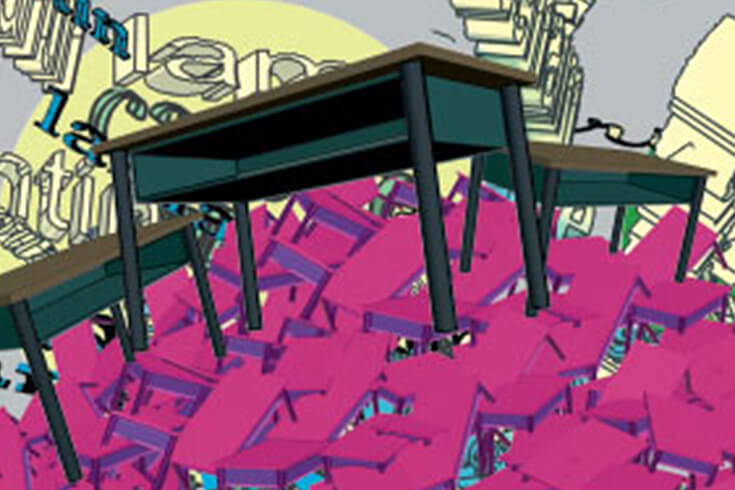It’s Friday night in the ballroom of the Quebec City Holiday Inn, and a lively cocktail party is under way:a jazz trio plays in the corner and waiters circulate with platters of hors d’oeuvres. But this is no typical cocktail-party crowd. People from Ethiopia, Peru, Haiti, and China, as well as Europeans and North Americans, are milling about. Over at the bar, a small cluster passionately debates the use of hyphens and the comparative merits of the Larousse French dictionary and its rival, the Petit Robert. An older man wonders why it’s okay to say le parking in France but not in Quebec. A vivacious young brunette pipes in with a cryptic comment: “A plane crashes with three hundred women and a tomcat and it’s still masculine.” The others nod in rueful agreement.
Such is the small talk at the Dictée des Amériques, the francophone world’s premier international spelling championship. Every spring, contestants come to Quebec City to prove their mastery of the Gallic idiom at what’s been called the Olympics of the French language. But although it’s been compared to the National Spelling Bee, the American contest depicted in the award-winning documentary Spellbound, the Dictée des Amériques is a very different kind of event. It’s based on an old-fashioned French spelling drill, the dictée, in which students transcribe a short French text — typically a short story or essay — read aloud by their teacher. The challenge resides not merely in getting the words right but also in understanding their context, which often tells transcribers what ending a word should have or how a particular verb is conjugated. “It isn’t just about memory, but about the meaning of words and sentences,” says Noëlle Guilloton, linguistic adviser to the Dictée. “We’re not dealing with trained monkeys who know how a word is spelled, but whether it has an h or a silent e on the end.”
This year the Dictée, now in its thirteenth edition, has drawn 109 contestants from twenty-three nations. Many are from French-speaking countries; others are simply francophiles, holding out in isolated pockets in such disparate places as Addis Ababa, Santiago, and Phoenix. They cling to the language of Molière in a world where English is increasingly the lingua franca of all that is modern, hip, and transnational?—?popular culture, the Internet, business, professional life. One contestant is Sherif Zaki, a young doctor from Cairo whose medical practice is entirely in English. “French is not a language that I use on a daily basis,” he says. “[For me] it’s a language of culture — reading French books, seeing French movies, reading about French history.” Another competitor says simply, “French is the language of pleasure.”
I also have a personal stake in this. As someone who attended a French-immersion school in Toronto and who now lives in Montreal with a Québécois wife and kids, I speak the language well enough. I wrote countless dictées during my school years and recall the experience with the same fondness as I do a visit to the dentist. But I never really grasped the deeper mysteries of French grammar, and I’m intrigued by the nerdy-cool quality of competitive spelling. As a friend remarked, “Spelling is the new knitting.” So I’ve decided to take part in the Dictée and test myself against the best in the world.
The next morning, a yellow school bus drops off contestants at Quebec’s National Assembly building. It is here, in the ceremonial Red Room of the provincial legislature, that the Dictée will take place. People are wandering around the lobby, waiting for the contest to begin. Many are competing for the first time; others are veterans who return year after year. Some are amateurs, others professionals — translators, writers, editors, proofreaders. One, Francine Mercier, is a retired teacher and librarian from Belgium and a member of a spelling club called Le cercle d’or (The Circle of Gold). Her training regimen consists of reading the entire Petit Larousse illustrated dictionary — all 1,855 pages of it. She’s currently at the letter m. “It goes back to my childhood,” she says. “I’ve always loved French. I like reading. I like looking up words I don’t know.”
Leigh Foster, a college student from Connecticut, is part of a Dictée dynasty of sorts; her father, mother, and brother have all competed in previous years. Her friends are mystified by her interest in French spelling. “Most of my friends ask why I’m going up to Canada for the weekend,” she says. “And I’m, like, ‘Oh, there’s a dictée.’ ‘Oh great, what’s a dictée?’ I keep having to explain: ‘Well, some guy reads a paragraph out loud and you try to write it down without making any mistakes.’ And they just look at me like I’m insane.” Leigh’s father, Mark, is competing again this year. The family’s home is littered with giant sets of French dictionaries, won in previous Dictées.
“I suppose most people don’t see it this way, but it’s like driving a Porsche,” says Mark, who is a French teacher by profession. “When you’ve got a two-volume Larousse set, it means you’re somebody. And in our house we have three or four of them, so it’s pretty cool.”
Mark and I end up sitting next to each other — we’re both in the non-competitive category. We take our places in the balcony while the official contestants are seated below on the ground floor. Some are wearing T-shirts and jeans; others are in suits and ties. Everyone is given a colour-coded exam booklet, a commemorative pen, and a piece of foam board to write on. “Even if it’s Saturday, use your Sunday writing,” Sylvio Morin, the organizer of the event, tells the contestants. “It’s no fun when we have to use a microscope or consult a hieroglyphics expert to read your handwriting.” The event is being taped for international broadcast on the French tv5 network, so there are cables everywhere. The contestants are told to cross their legs so they won’t be hunched over too much — “so we can see your wonderful faces.”
The dictée wasn’t always considered fodder for prime-time TV. Although long a staple of traditional French education, it fell out of favour during the 1960s because its rigid emphasis on rule-based grammar was at odds with the free-spirited mood of the times. “In the dictée, there’s this notion of order — practically of dictatorship — where you impose a text, you impose a way of writing,” says Guilloton. “In the sixties and seventies, it was all about openness, free association, and freedom of expression, and this was the priority in teaching methods.”
But two decades later, Bernard Pivot, the host of a literary talk show in France, was looking for a word game he could use to encourage his audience to read more books. He hit upon the dictée. The first instalment of his televised dictations hit the airwaves in 1985 and, to his surprise, drew large audiences. “There is nothing less telegenic than a dictée,” says Pivot. “Nevertheless, it had a huge impact.”
Pivot’s show, Les Dicos d’Or (The Golden Dictionaries), was on the air for twenty years and came to an end only last November. During that time, it sparked a renewed interest in the dictée in countless schools, as well as a resurgence of spelling clubs and national competitions across the francophone world. There was even an effort to transplant the contest to other cultures — like the Arabic dictée that was attempted, and quickly abandoned, in Lebanon. “There were too many obstacles,” says Pivot. “It was either literary Arabic, and a lot of people didn’t know how to write it, or there were different ways of spelling the same words.”
Pivot’s departure from the scene left the Dictée des Amériques as the main international French spelling championship. It is well situated in Quebec, a province that considers itself a standard-bearer of French culture in the world. “You mustn’t forget that the Québécois are in the middle of an ocean of anglophones,” says Pivot. “For the Québécois, the survival of their language is almost the survival of Quebec itself.”
Back in the Red Room, it’s time to start the Dictée. Every year, the text is composed by a different Quebec writer. This time organizers have made a surprising choice: Luck Mervil, a Haitian-born Montreal pop star better known for hosting a reality-TV show than for his literary output. “I’m a lover of the language,” he had told me earlier. “I read three books a week.”
Mervil takes his place on a bar stool at the front of the room and begins reading slowly: “Combien d’années faudra-t-il pour faire comprendre aux habitants de cette planète que la vie est éphémère?” (How many years will it take to make the inhabitants of this planet understand that life is ephemeral?) So far, so good; the first sentence doesn’t seem too difficult. But it gets progressively harder: junior contestants write only the first part, while participants in the most competitive category — French-language professionals — complete the entire Dictée.
Before long, I’m running into trouble. The text, which has an antiglobalization theme, seems to revolve around a character called “Saint Gord” and some “insatiable materialists” and “hierarchical heralds” who are preventing the dawn of an “era of justice” (or is that an “air of justice”? — impossible to tell; they sound alike in French). The text is designed to be a linguistic minefield, full of tricky grammar and spelling traps to ensnare the unwary. Beads of sweat start to form on my forehead and quickly multiply as I struggle over phrases like “the manatees do not lament” and “autarchic politics and hegemonic economics.” Two hundred and eighty-seven words later, I breathe a sigh of relief. It’s over.
After a coffee break, the next phase begins: the corrections. The dictée is projected onto a giant screen, and members of the jury go through it sentence by sentence, highlighting and explaining the pitfalls. You can practically hear gasps of horror from the contestants as they learn that “credo” is always spelled as though singular, that “ill-intentioned” is written as one word, and that “Saint Gord” is actually the Senegalese poet and independence leader Leopold Senghor.
Some of the jury members are from the Office québécois de la langue française, the province’s infamous language police. “Is that the Canadian version of the Academie française?” asks Mark. “They leap out from behind the bushes if you use an infinitive the wrong way and drag you off to language prison?” Mark is looking pleased with himself. “Actually, it didn’t seem like a very hard dictée until you got to the last part, where there were a bunch of African words I’m not aware of,” he says. He recalls a much tougher dictation he wrote six years earlier at the hands of another Haitian-Canadian writer, Dany Laferrière. “He did this whole thing on a disease called kwashiorkor and problems in Haiti. And I knew nothing. Nothing.”
Although French isn’t an especially difficult language to learn to speak, mastering its written form requires knowledge of complex grammatical rules. Nouns come in two genders, masculine and feminine, which must be memorized, and the end of almost any word that modifies a noun must reflect its gender. But because the endings are unpronounced, the gender and therefore the spelling of many words can be unclear during a dictée. And since French also has innumerable homophones, as well as grammatical exceptions for such things as words of foreign origin, you can’t be sure what kind of word you’ve just heard, much less how to spell it. “You go, ‘Oh my god,’” says Mark. “‘Is it being used as an adjective? Is it being used as an adverb? Do I make it agree?’ You change everything back and forth five or six times, and then you get down the stairs and the person sitting next to you while you’re having your coffee goes, ‘You thought it was an adjective, huh? You’re screwed.’”
We’ve finished writing the dictée, but it’s only mid-morning and there’s still a long day ahead. There will be an impossibly difficult multiple-choice quiz and, if the first dictée produces a deadlock, a second dictée to serve as a tiebreaker. There will be more coffee breaks, a buffet lunch, and some banter about whether the Europeans are using performance-enhancing drugs. And Luck Mervil will sing a musical version of the dictée on his guitar.
It’s late afternoon and the jury has finally finished marking 109 exam papers. Before the cameras start rolling again, organizers warn the contestants not to pick up their crystal trophies from the wrong end and to make sure to smile if they win, “even if it’s just third place. And if you’re grand champion, let’s see an explosion of joy.”
They begin announcing the winners, starting with the junior categories from the non-French-speaking countries: Ethiopia, China, Romania, Egypt, and the United States all take home honours. Then come the francophones — the usual suspects: Belgium, Switzerland, France. Some are hoping the top prize will stay in Quebec, but it goes instead to a fifty-three-year-old French teacher from Hazebrouck in northern France: Bruno Dewaele, a bookish, white-haired man wearing a seersucker suit with a yellow shirt and green tie. Earlier in the day, his cockiness had made him stand out from the others. While everyone else agonized about the mistakes they thought they’d made, he told anyone who would listen that the jury had mistakenly hyphenated “porte à faux,” meaning “to be in an unstable or ambiguous situation.” A double champion in France, Dewaele laughed off today’s Dictée. “I would have liked it to be harder, so it would be more selective,” he said. “It’s a very nice text, but honestly I can’t say I found it difficult.”
Dewaele was now the champion, with the first perfect score in the history of the Dictée des Amériques. His prize? A new set of dictionaries and a lifetime ban on competing in Quebec City — a prohibition intended to ensure that the same linguistic heavyweights don’t dominate the contest year after year.
My own ordeal isn’t over. My dictéeis to be corrected by Guilloton, who created most of the linguistic traps in the text. She pronounces my first sentence “excellent — zero mistakes,” but goes on to mark up my exam booklet with neat red marks. I’ve misspelled “essayists” and “rap” and “disinherited.” I’ve hyphenated “postmodern.” I’ve missed accents and plurals and agreements between nouns and verbs. My final score: thirty-three mistakes. If I were a competitor, my score would easily be at the bottom. She calls it an “honourable result,” but I think she’s being charitable.
When I first signed up for the Dictée, I was prepared for a dry, joyless exercise of the kind I recalled from my school days, and which my own children now have to endure. Instead, I found people who took genuine pleasure in the French language, who saw its plethora of grammatical rules not as a burden but rather as a game to be enjoyed, and who would readily travel halfway around the world to be with others like them. Their enthusiasm was infectious — and I may well return next year.





